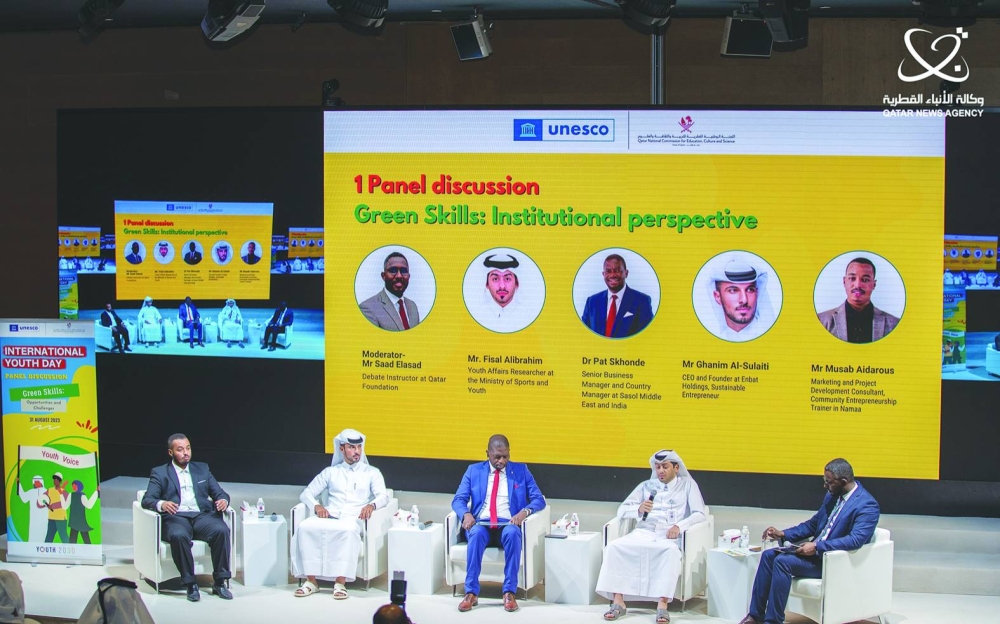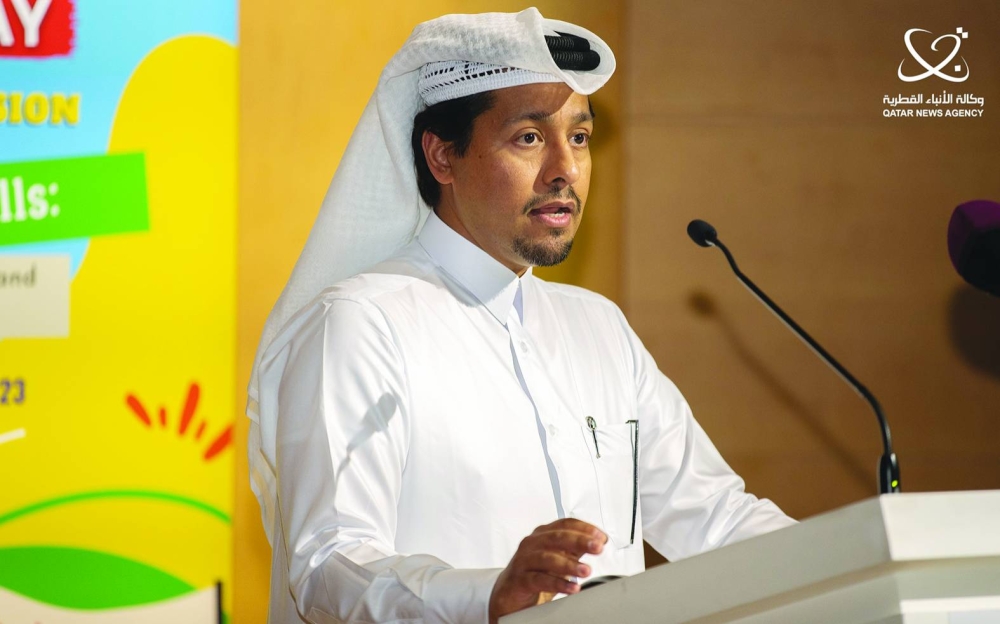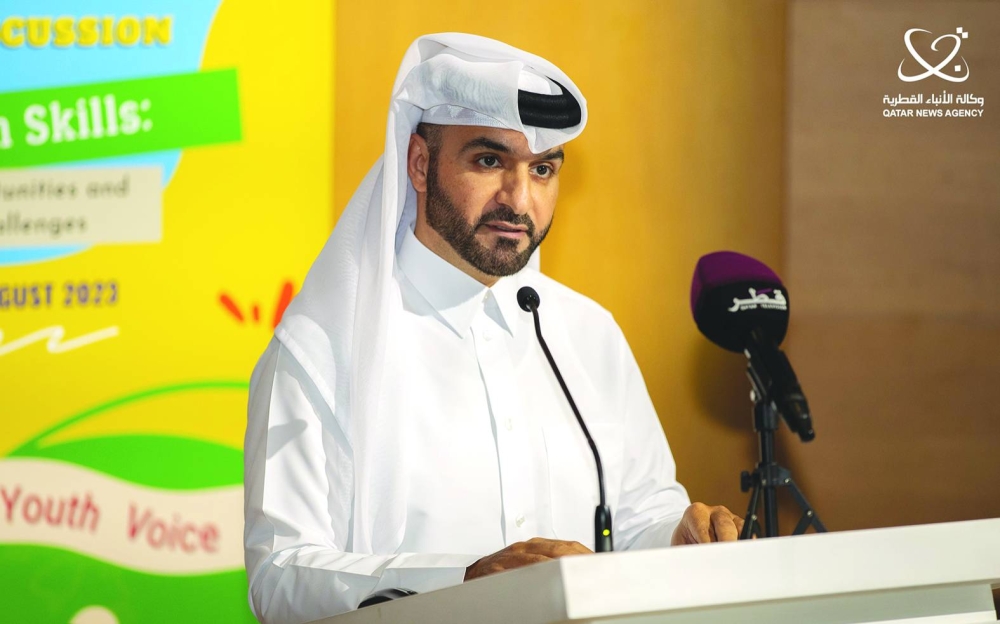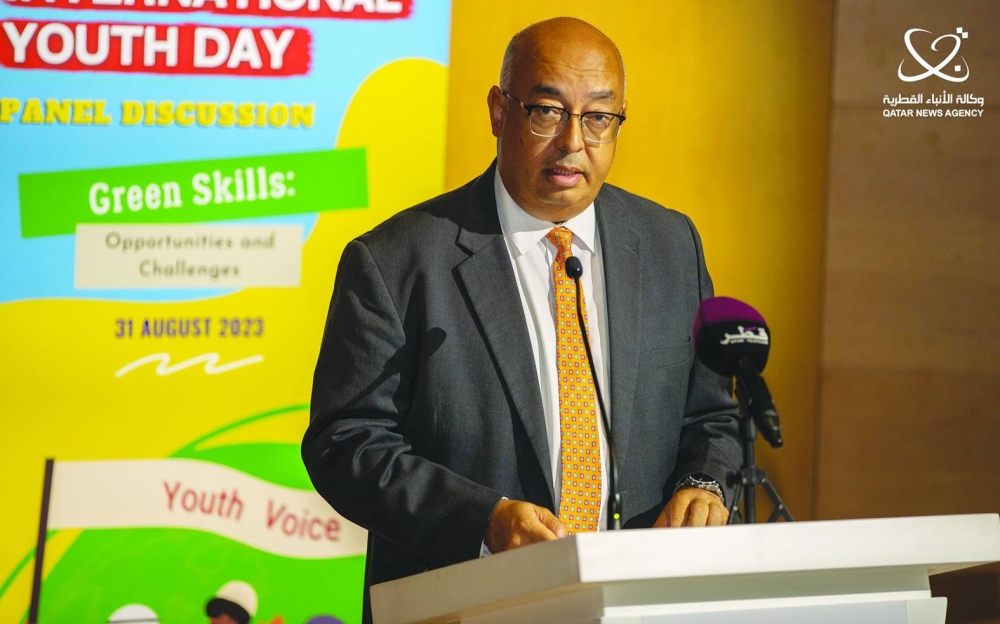The Qatar National Commission for Education, Culture, and Science, in collaboration with the office of the UN Educational, Scientific and Cultural Organisation (Unesco) in Doha, organised a special celebration on Thursday on the occasion of the International Youth Day 2023, under the theme "Green Skills: Opportunities and Challenges."
The event aimed to facilitate dialogue and knowledge exchange regarding the needs, challenges, and opportunities in developing green skills in Qatar. It discussed and explored ways to support the agenda of greening education, provide a common platform between generations, and contribute to social and economic development in Qatar by transitioning towards environmental development, considering it a fundamental pillar of Qatar's National Vision 2030.
Acting Secretary-General of the Qatar National Committee for Education, Culture, and Science Ali Abdulrazzaq al-Marafi highlighted that the International Youth Day, established by the UN General Assembly back in 1999, has the overarching goal of increasing the engagement of young people in various facets of life. This is particularly pertinent considering the myriad of challenges they confront such as poverty, joblessness, health issues, and inadequate education. Despite these hurdles, he underscored that the youth population also embodies qualities of innovation, dynamism, and adaptability.
Al-Marafi underscored that currently, youth account for more than 30% of the global population, representing future leaders who wield substantial influence in matters pertaining to the economy, society, and politics.
He said that this year's focus on green job skills is a result of the significant impact of these skills in supporting the green economy, which mitigates environmental risks and works towards sustainable development while maintaining the ecological performance of the earth's systems.
He highlighted that one of the main goals of Qatar's National Vision 2030 is to build an excellent education system that responds to future market needs and equips learners with skills to contribute to society. Various state institutions, particularly the Ministry of Education and Higher Education, have shown great interest in providing the community and youth with the necessary skills, values, and knowledge to achieve the desired social, economic, and environmental transformations.
He pointed out that transitioning to a clean and environmentally friendly economy contributes to resource management, achieving social justice. This aligns with Sustainable Development Goal 8, which emphasises promoting sustainable and inclusive economic growth and providing decent work for all.
He considered the day's celebration as a platform to highlight the efforts of youth in achieving sustainable development goals, allowing them to voice their opinions to decision-makers and contribute to shaping policies and launching community initiatives to address global challenges.
For his part, representative of Unesco in the Arab Gulf States and Yemen Salah Eddine Zaki Khalid, who is also Director of Unesco Office in Doha, noted that the International Youth Day, since its adoption over two decades ago, has been a global celebration that recognises the role of youth in creating social change. It also provides an opportunity to celebrate youth achievements, enhance their rights and voices, and address the challenges they face.
He highlighted that the world today faces unprecedented environmental challenges that require innovative solutions and collective efforts from all members of society. He emphasized that the convergence of governmental plans and strategies with private sector experiences is essential to develop innovative solutions that coordinate economic growth with environmental preservation. He stated that in the journey towards a more environmentally conscious and sustainable future, youth take the lead, and by providing them with the right knowledge and skills, they become the driving force for change and transformation. By enhancing curricula that align with market needs and environmental requirements, youth can pursue their professional careers armed with green skills that consider the environment. They will become ambassadors for sustainable practices and champions of circular economies, as well as agents of change.
Khalid said that green skills are not confined to a specific field, but they encompass the knowledge, abilities, values, and attitudes required for sustainable life and flexible communities, contributing to economic growth. UN estimates suggest that by 2030, over 8mn job opportunities for youth could be created through the adoption of green skills and technologies. However, he noted that challenges remain, as around 67% of youth still lack access to digital skills due to resource limitations.
He highlighted that youth are at the core of educational programmes and efforts. A survey conducted by Unesco last year, involving 17,000 youth from 160 countries, revealed that over 70% of them lack adequate education on climate change in schools, underscoring the need to include climate action in curricula. He mentioned that Unesco launched the Greening Education Partnership in September 2022 to accelerate climate change education worldwide. Additionally, the Unesco Youth Forum serves as a unique platform bringing young minds from around the world together to engage in constructive dialogues and shape future policies. He said that the 13th Youth Forum in Paris in November will focus on the social impact of climate change, and it supports youth-led research through the Youth as Researchers initiative.
He emphasised that youth participation is crucial amid emerging and complex environmental, social, and economic challenges. He called for unity and collective action to achieve a more sustainable and inclusive world for all.
Director of the Green Development and Environmental Sustainability Department at the Ministry of Environment and Climate Affairs Sheikh Dr Saud bin Khalifa al-Thani regarded the International Youth Day as a global celebration of the vitality and creativity of young people. He emphasised its role in highlighting their capabilities to lead change and transform societies. In the context of environmental sustainability, he urged everyone to recognize that the pursuit of sustainable development is closely tied to the aspirations of the youth.
Sheikh Dr Saud underscored that Qatar's journey towards sustainable development is commendable due to its ambitious initiatives and progressive, advanced thinking strategies. He affirmed that Qatar's National Vision 2030 serves as a guiding light, charting a path towards a diverse, knowledge-based economy and ensuring a high quality of life for current and future generations. He said that young leaders play a pivotal role in achieving this vision.
He regarded environmental sustainability as a fundamental pillar of Qatar's development journey, noting that the challenges posed by climate change, environmental pollution, and resource depletion are not abstract concepts but real threats witnessed daily through severe droughts, sudden floods, and annual forest fires. He encouraged the youth to take the initiative in shaping a sustainable trajectory forward.
He highlighted that this year's International Youth Day coincides with the United Nations' convening of the Ecosystem Restoration Summit. This alignment emphasises that choices made today will reverberate across generations. He considered environmental sustainability an opportunity for innovation and finding ingenious solutions to complex issues, fostering collaboration across disciplines.
He called upon the young minds in Qatar to seize opportunities and embrace sustainability principles in their educational, professional, and civic choices. He urged them to work towards enhancing an environment conducive to innovation, as every action, no matter how small, contributes to achieving the overarching goal of environmental, social, and economic sustainability.
The event included a panel discussion involving a group of specialised researchers and individuals interested in various domains of development, sustainability, environment, climate change, energy, and green skills.
Qatar
Qatar focuses on arming youth with green skills
Qatar National Commission for Education, Culture, and Science and Unesco celebrate International Youth Day




